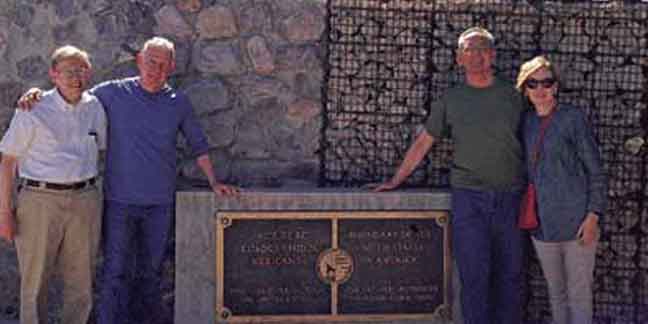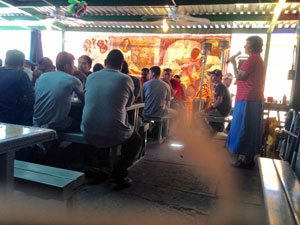 Pictured: Jesuit Father John Michalowski, parochial vicar at St. Peter Church in Charlotte, along with three St. Peter's parishioners, Bob Macpherson, Martha Schmitt and Dave Zablotny, made a three-day mission trip in early May to the Kino Border Initiative located at the Arizo-na-Mexico border. (Photos provided by St. Peter Church)CHARLOTTE — Jesuit Father John Michalowski, parochial vicar at St. Peter Church in Charlotte, along with three St. Peter's parishioners, Bob Macpherson, Martha Schmitt and Dave Zablotny, made a three-day mission trip in early May to the Kino Border Initiative located at the Arizona-Mexico border.
Pictured: Jesuit Father John Michalowski, parochial vicar at St. Peter Church in Charlotte, along with three St. Peter's parishioners, Bob Macpherson, Martha Schmitt and Dave Zablotny, made a three-day mission trip in early May to the Kino Border Initiative located at the Arizo-na-Mexico border. (Photos provided by St. Peter Church)CHARLOTTE — Jesuit Father John Michalowski, parochial vicar at St. Peter Church in Charlotte, along with three St. Peter's parishioners, Bob Macpherson, Martha Schmitt and Dave Zablotny, made a three-day mission trip in early May to the Kino Border Initiative located at the Arizona-Mexico border.
The Kino Border Initiative is a binational organization that works with migrants in Nogales, Ariz., and Nogales, Mexico. Sponsored in part by the Jesuit Refugee Service, its mission is to promote U.S.-Mexico border immigration policies that affirm the dignity of the human person.
The small group from St. Peter's went to Nogales to experience the reality of so many displaced, deported and asylum-seeking persons – a daily reality along the border.
Father Michalowski noted, "As members of the Social Justice Committee at St. Peter Parish, we knew of the American bishops' concern for the U.S. government policies which have been breaking up families, where one or the other of the parents is here illegally and some or all of the children were born in the U.S. and are American citizens. We were also aware that because of the stalemate in Congress, due to an unwill-ingness to compromise, no meaningful immigration reform has been able to be passed in years.
"What we saw and heard on both sides of the border in Nogales only confirmed what the bishops and others have been saying."
The KBI pilgrims shared their experience with fellow parishioners June 5 at St. Peter's Biss Hall with a presentation between Sunday Masses.
"No matter what your viewpoint is on immigration policy, the face of these migrants and their stories will make you feel heartbroken, so sad, ashamed and angry," Schmitt said.
The first stop for the group was the KBI Comedor, a Mexican-version of a soup kitchen, in Nogales, Sonora/Mexico.
At the Comedor, Schmitt said, she met a man who had been recently deported after living in Nashville, Tenn., for 19 years. "He left behind his wife and three daughters, two who had been born in the U.S. I asked if he planned on trying to reunite with them and he said, 'Of course. I will go back as soon as I can and have to trust in God,'" Schmitt recounted.
The following day they visited the Kino shelter for women and children who have no place to live and are in the process of being deported. According to Schmitt, these women and their children are typically victims of domestic violence in their home countries and seek asylum in the U.S.
The humble shelter typically houses eight women, who share a small kitchen and living room, bathroom and two bedrooms with bunk beds. At the time of their visit, they met a woman from Honduras with four children there.
 "The children had spent a year hiding in small towns in Mexico, sleeping and eating on the streets for much of the time," Schmitt said. The mother of the children told them that her children "felt like they were on some kind of wonderful vacation now that they were in the apartment."
"The children had spent a year hiding in small towns in Mexico, sleeping and eating on the streets for much of the time," Schmitt said. The mother of the children told them that her children "felt like they were on some kind of wonderful vacation now that they were in the apartment."
The pilgrims hope to continue raising awareness of the immigration problems, as well as make a return trip to Kino with another group.
"As a person who had the opportunity to see these faces and hear stories firsthand, I want to make sure others hear these stories so changes can be made to policies to help make the entire immigration situation more humane," Schmitt said.
"It is not my job to question their journey, but only to know they are all God's people on a journey, trying to do the best they can for them-selves and their families."
– Rico De Silva, Hispanic Communications Reporter
"The children had spent a year hiding in small towns in Mexico, sleeping and eating on the streets for much of the time," Schmitt said. The mother of the children told them that her children "felt like they were on some kind of wonderful vacation now that they were in the apartment."


